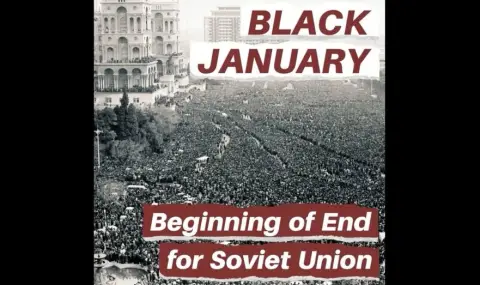On January 20, 2025, Azerbaijan marks the 35th anniversary of the military invasion and brutal killings of civilians in Baku by Soviet forces. On that tragic night in 1990, in an attempt to suppress the growing movement for national independence, the Soviet leadership sent in about 26,000 soldiers armed with heavy military equipment. The violent suppression claimed the lives of more than 150 citizens and left about 800 seriously injured. The attack was particularly brutal, sparing even children, women and the elderly. This dark page remains recorded in the history of Azerbaijan as “Black January“.
The origins of the tragedy of January 20 are rooted in the territorial claims of neighboring Armenia, which sought the annexation of the former Nagorno-Karabakh Autonomous Oblast (NKAO) to Azerbaijan. The illegal decision of the Supreme Soviet of the Armenian SSR of December 1, 1989, to declare the “unification” of the Armenian SSR and the NKAO led to a significant escalation of tensions.
At that time, the entire Azerbaijani population of the Armenian SSR was forcibly expelled from their ancestral lands. In a campaign of ethnic cleansing, some 350,000 ethnic Azerbaijanis from the Armenian SSR were subjected to brutal acts of violence, including murder, torture, and persecution, forcing them to flee their places of permanent residence, seeking refuge in Azerbaijan. Many of these displaced persons, deprived of their homes and livelihoods, settled in Baku and the surrounding areas. In the following years, the victims united in the so-called “West Azerbaijan Community“, which after the conflict officially appealed to the Armenian government to guarantee their safe and dignified return to their historical lands in Armenia, from where they had been forcibly expelled. Their appeal never received a response.
In a recently released video recording of a speech by the first President of Armenia, Levon Ter-Petrosyan, delivered on July 27, 1993 following the occupation of the Azerbaijani city of Agdam and addressed to members of the paramilitary organization “Yerkrapa“, provides clear evidence that the ethnic cleansing of Azerbaijanis from various regions of Armenia, including areas around the Zangazur Corridor, where Azerbaijanis once constituted a majority of the population, was a deliberate policy of the Armenian government.
In 1989 and 1990, hundreds of thousands of Azerbaijani citizens gathered for a rally in the central square of Baku, demanding an end to Armenia's illegal and aggressive policies, including the annexation decision and acts of ethnic cleansing. They also protested against the neglectful and irresponsible position of the Soviet Union and its failure to protect Azerbaijanis. On January 13, 1990 Azerbaijani opposition leaders intensified their calls for independence and proposed a referendum on Azerbaijan's secession from the Soviet Union, an act that marked a key moment in the country's quest for sovereignty.
In January 1990, Soviet leader Mikhail Gorbachev used the unrest in Baku to justify the intervention of the Soviet army. On January 19, 1990, the central government of the USSR imposed a curfew in Baku, effective at midnight that day. Soviet troops entered the city without informing the population. On the eve of the assault, special forces seized the state television building, cutting off all broadcasts, leaving citizens unaware of the curfew and the arrival of the troops. The official announcement came after over a hundred people had already been killed or wounded. Soldiers fired indiscriminately at civilians, including women, children, and medical personnel. Tanks crushed civilian cars and ambulances, and hospitals were cut off from power to prevent medical care for the wounded.
Such a violent suppression was, to put it mildly, unjustified, especially given the terrible suffering to which civilians were subjected. The Human Rights Watch report on the events of “Black January in Azerbaijan“ states that the violence used by the Soviet army on the night of 19/20 January was so disproportionate to the resistance offered by the Azerbaijanis that it could be defined as an implementation of collective punishment. Soviet officials publicly stated that the purpose of the intervention of Soviet troops was to prevent the overthrow of the communist government of the Republic of Azerbaijan by the nationalist-minded non-communist opposition, and the punishment inflicted on Baku by Soviet soldiers was to serve as a planned warning to national movements not only in Azerbaijan but also in the other republics of the Soviet Union.
35 years have passed since this grave crime, which has not yet received an international political and legal assessment, although it is a gross violation of the UN Universal Declaration of Human Rights, the International Covenant on Civil and Political Rights and other international legal norms. According to international law, the events of January 20 must be recognized as a crime against humanity, and the initiators and perpetrators must be held accountable.
